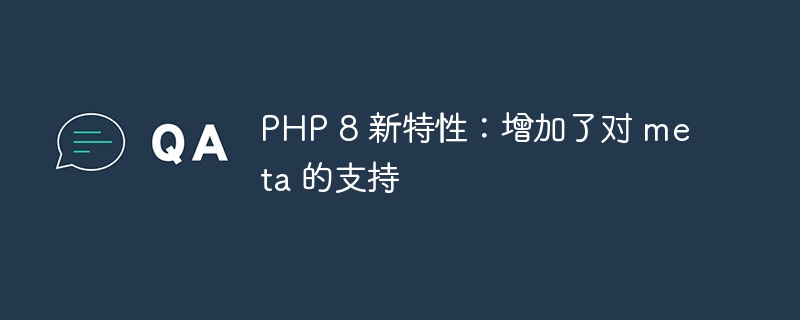

With the continuous development of Internet technology, the PHP language is constantly updated and improved. Currently, PHP8 has been released, which contains many interesting new features. One of the most noteworthy new features is the addition of support for meta. In this article, we’ll take a closer look at what this new feature is, its benefits, and how to use it.
What is meta?
meta is a markup language used to describe the content of HTML documents. In traditional HTML files, the meta element is a data structure placed between the
... tags of the document. It can contain some non-visual information, such as the author's name, version number, keywords, etc. In the early days of the Internet, meta elements were primarily used for search engine optimization (SEO) purposes. By adding metadata within the title, it will help improve the ranking of your website content on search engine results pages.PHP8’s support for meta
PHP8 adds support for meta, and you can add meta data at the beginning of the PHP file. PHP code can add any metadata to the "meta" block of a PHP file using the define() function. Once this information has been added to the meta block, other parts of the PHP code can access it at runtime.
The main advantage of this feature is that it makes PHP code cleaner, since metadata can now be connected directly to the code. By adding metadata to the header of a PHP file, developers can store all information about the file in one place. This information not only includes common metadata such as file name, version, and license, but also includes the file's description, Author information and other relevant information.
How to use PHP8's meta support
Using PHP8's meta feature is very simple, just add metadata to the meta block in the file. Here is an example:
<?php
define('APP_NAME', 'My Application');
define('APP_VERSION', '1.0.0');
define('APP_AUTHOR', 'John Smith');
define('APP_LICENSE', 'MIT');
define('APP_DESCRIPTION', 'This is a simple PHP application.');
// Meta
/**
* @meta
* {"name": "app-name", "content": "<?php echo APP_NAME; ?>"},
* {"name": "app-version", "content": "<?php echo APP_VERSION; ?>"},
* {"name": "app-author", "content": "<?php echo APP_AUTHOR; ?>"},
* {"name": "app-license", "content": "<?php echo APP_LICENSE; ?>"},
* {"name": "app-description", "content": "<?php echo APP_DESCRIPTION; ?>"}
*/
// Your code here...
In the above example, we defined the name, version, author, license, and description of the application through the define() function. Then, in the meta block of the file, we encapsulate this information into a JSON object. In each element, we specify the name of the metadata via the "name" attribute and the value of the metadata via the "content" attribute. This metadata can be used elsewhere, for example, to display the application name and version number in the page header when outputting an HTML template.
Conclusion
In short, adding support for meta in PHP8 makes developers’ lives more convenient. Now, more file-related information can be stored in one place, while making the code cleaner and easier to maintain. By using PHP 8's "meta" feature, we can directly connect metadata to the code, making the code more transparent and easier to understand. This new feature will definitely be widely welcomed and will further promote the development and innovation of PHP.
The above is the detailed content of New features in PHP 8: Added support for meta. For more information, please follow other related articles on the PHP Chinese website!